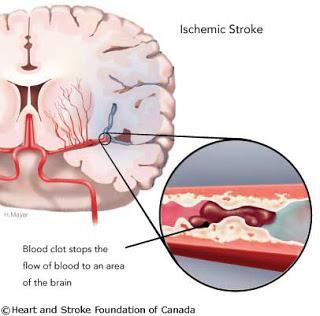Heavy tokers may be at higher risk, but alcohol is the hidden confounder.

Young people don’t suffer from strokes, as a rule. And when they do, at least half the time there is no obvious cardiovascular explanation. So it’s not surprising that drugs are often invoked as the culprit.
A New Zealand study earlier this year once again raised the specter of a possible link between stroke and marijuana smoking. As reported by Maia Szalavitz at Time Healthland, the confounding issue, as is typical of such studies, is the coexisting use of other drugs, like alcohol and cigarettes. As Szalavitz writes:
The stroke study, which incorporated preliminary data, is the first trial of its kind to study a possible connection between marijuana use and stroke. It included 160 patients aged 18 to 55 who had suffered a stroke connected to a blood clot in the brain, and who agreed to have their urine tested for marijuana within 72 hours of the stroke. These results were compared to those from 160 controls who had not had a stroke but came to the hospital for other reasons. They were matched on age, gender and ethnic background, all of which can also affect the risk for this type of stroke. About 16% of the stroke patients showed traces of marijuana in their urine, compared to 8% of those in the control group, suggesting a doubling of the risk of stroke.
However, because of nicotine and other confounding variables, that study was considered inconclusive. In an earlier study published in Stroke, the journal of the American Heart Association, Valerie Wolff and colleagues from the University of Strasbourg in France searched the medical literature and found 59 cases of stroke in which cannabis could be considered a cardiovascular risk factor. The investigators used only cases that had been confirmed by neuroimaging. The researchers focused on cases where a stroke had occurred while smoking marijuana, or within a half hour after the last joint or bong hit.
But proving a cause and effect relationship is tricky. Assuming, for now, that all of the strokes in question were not caused or compounded by alcohol or drugs other than marijuana, the French scientists postulated several mechanisms that could conceivably account for a cannabis-related ischemic stroke (a stroke caused by obstruction of a blood vessel). These include orthostatic hypotension, altered cerebral vasomotor function, major swings in blood pressure, and cardiac arrhythmias. However, the only solid commonality in cannabis-related strokes was that the users were more likely to be heavy smokers.
In the 50 strokes the researchers were able to confirm by cerebral imaging, the patterns in some patients were similar to those observed in a syndrome called reversible cerebral vasoconstriction syndrome (RCVS). RCVS is marked by severe headaches, strokes, and brain edema, but symptoms typically resolve in a few months. “Reversibility of the vasoconstriction within 12 weeks is a key point of this syndrome,” the authors write. “The long duration of stenosis [blockage] argues in favor of a drug-induced immunoallergic vasculitis rather than vasospasm. Our point of view is that this disorder may be considered as a variant of RCVS,” rather than as a garden-variety ischemic stroke triggered by excessive use of cannabis.
According to the French study, “The most frequently presented characteristics of cannabis users who experienced a stroke are young male chronic tobacco and cannabis abusers who have had an unusual high consumption of cannabis and alcohol before stroke.” The most convincing mechanism to explain ischemic strokes in young people, the researchers say, is “reversible cerebral angiopathy involving several arteries, associated with cannabis consumption in association with tobacco and alcohol use.”
And there you have it. Smoke weed, and you appear to have a slight risk of suffering stroke, which, under age 50, is an extremely uncommon medical event. Add tobacco, and the stroke risk goes up. Add alcohol, and the stroke risk ratchets even higher. By itself, marijuana appears to be a minor factor in strokes—but it appears likely that pot is indeed the culprit at least some of the time.
“Cannabis-related stroke is not a myth,” the scientists conclude, “and a likely mechanism of stroke in most cannabis users is the presence of reversible multifocal intracranial stenosis (MIS) induced by this drug. The reality of the relationship between cannabis and stroke is, however, complex, because other confounding factors have to be considered (ie, lifestyle and genetic factors).”
Wolff V., Armspach J.P., Lauer V., Rouyer O., Bataillard M., Marescaux C. & Geny B. (2013). Cannabis-related Stroke: Myth or Reality?, Stroke, 44 (2) 558-563. DOI: 10.1161/STROKEAHA.112.671347
Graphics Credit: http://www.strokegenomics.org/

